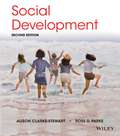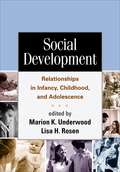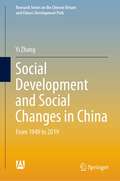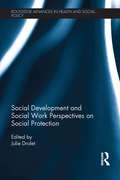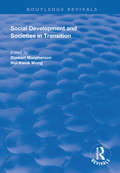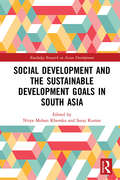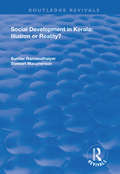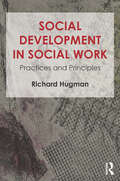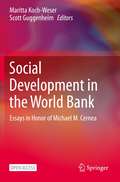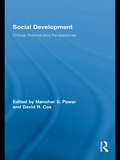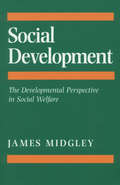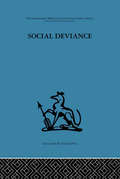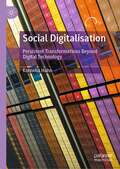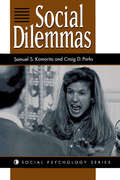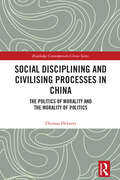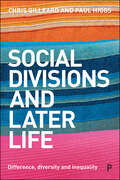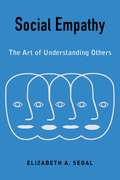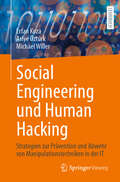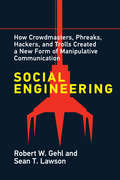- Table View
- List View
Social Development
by Alison Clarke-Stewart Ross D. ParkeSocial Development, 2nd Edition provides psychologists with a comprehensive, scholarly, engaging, and up-to-date treatment of theoretical insights and empirical findings in the field of social development. <P><P>It conveys the excitement of recent advances along with the accumulated knowledge that forms the basis of the field. Psychologists will gain a better understanding of cultural variation, both among societies around the world and within our own society.
Social Development
by Marion Underwood Lisa RosenThis authoritative, engaging text examines the key role of relationships in child and adolescent development, from the earliest infant-caregiver transactions to peer interactions, friendships, and romantic partnerships. Following the sequence of a typical social development course, sections cover foundational developmental science, the self and relationships, social behaviors, contexts for social development, and risk and resilience. Leading experts thoroughly review their respective areas and highlight the most compelling current issues, methods, and research directions. End-of-chapter suggested reading lists direct students and instructors to exemplary primary sources on each topic
Social Development and Social Changes in China: From 1949 to 2019 (Research Series on the Chinese Dream and China’s Development Path)
by Yi ZhangFrom a sociological perspective, this book explores issues related to population mobility, family pensions, and the lives of workers and peasants during the 70 years of urbanization since the founding of New China from the perspectives of population, pension security, employment structure transformation, and social insurance systems, thus exploring the deep logic behind China's successful experience. The relevant issues studied in this book are a systematic summary of the experiences and lessons learned from social reforms since the founding of the country and also provide guidance for the future direction of social development and change.
Social Development and Social Work Perspectives on Social Protection
by Julie L. DroletSocial protection is now considered a development milestone and an important tool in combating poverty. Interventions can include, for example, health insurance, public works programs, guaranteed employment schemes, or cash transfers targeting vulnerable populations groups. This innovative volume is designed to develop understanding about the role and contribution of social protection globally and to share innovative practice and policies from around the world. It explores how to cover an entire population effectively, especially those who are at risk or who are already in a situation of deprivation, and in a sustainable manner. Divided into two parts, the book begins by exploring the theoretical underpinnings of social protection, discussing the social work and social development perspectives and concepts that currently shape it. The second part is comprised of case studies from countries implementing successful social protection initiatives, including Brazil, India, South Africa, Ghana, Nigeria and Indonesia, and reveals how the impact of a successful social protection intervention on poverty, vulnerability and inequality can be dramatic. This volume is an important reference for advanced students and researchers from a range of disciplines including social policy, social work, development studies, geography, planning, economics, sociology, population health and political science.
Social Development and Societies in Transition (Routledge Revivals)
by Stewart MacPherson Hoi-Kwok WongFirst published in 1998, this volume features case studies which reflect the central mission of the ICSW (International Council on Social Welfare) to advance social justice, welfare and development. Contributors including practitioners, policy makers and academics have produced articles rich in reflections on real-life projects and experiences, representing countries at various stages of economic and social development. Issues discussed include poverty alleviation, social development trends in late 20th century Asia, and opportunities and education for women and the disabled, along with international priorities for social welfare and development.
Social Development and the Sustainable Development Goals in South Asia (Routledge Research on Asian Development)
by Nitya Khemka Suraj KumarThis book assesses the roadmap for the implementation of the SDGs in South Asia, focusing in particular on the areas of poverty reduction, inequality, health/well-being and water and sanitation. South Asia is amongst the fastest growing regions in the world, with an aggregate GDP in excess of two trillion US dollars, but at the same time it has significant deficits in human development, with 37 per cent of the world's poor and nearly half of the world's malnourished children. For South Asia, the United Nations' Sustainable Development Goals (SDGs) represent a constructive opportunity to end many of the region's deprivations in a time-bound and systematic manner. Starting with the legacy of the Millennium Development Goals, the book goes on to provide a country-by-country overview of strategies for addressing the problems of poverty, health, water and sanitation. South-South Cooperation and in particular the South Asian Association for Regional Cooperation (SAARC) are discussed and, finally, the editors present a summary of policy priorities for social development. This book aims to be a useful resource for researchers, policy influencers, planners, implementers, students, and activists aiming to push to achieve the SDGs.
Social Development in Kerala: Illusion or Reality?
by Sundar Ramanathaiyer Stewart MacPhersonThis title was first published in 2000: There has been considerable academic interest in the innovative development programme taking place in Kerala, India. Much has been published on the specific "achievements" of the programme, such as literacy, health care, communication and demographic indicators. However, lurking beneath the surface are the harsh realities of chronic unemployment, poverty and deprivation among the elderly and weaker sections of the society, the oppression of women and the inefficiency of the government. These problems are revealed in this book through in-depth empirical research undertaken by a native Keralan. In the light of this material, this text questions whether the Kerala model of development should indeed be regarded as worth emulation.
Social Development in Social Work: Practices and Principles
by Richard HugmanSocial work has always been concerned with the development of society as the basis for achieving the well-being of individuals, families and communities. Interest in this important aspect of social work is now seeing a resurgence, not only in the ‘developing countries’ of the global South, but also in the global North. This innovative book provides an introduction to the area. Using concrete examples taken from practice around the world, Social Development in Social Work address questions such as: How should social development be understood as a core aspect of social work practice? What is the significance of economics, politics and the environment for a developmental approach in social work? How may a comparative understanding of social welfare practices, programs and policies enhance social development in social work? In what ways does social development contribute to international and domestic social work? What skills, knowledge and theory do social workers need to practise in this field? Arguing that social development should be at the centre of contemporary social work practice and theory, this book is ideal for social work students and academics with an interest in social development, international social work, social justice, social policy and community social work.
Social Development in the World Bank: Essays in Honor of Michael M. Cernea
by Maritta Koch-Weser Scott GuggenheimThis open access book honors the work of Michael Cernea, who was the World Bank’s first professional sociologist, by taking on and extending his arguments for "putting people first.” Cernea led a community of social scientists in formulating and promoting a comprehensive set of innovative and original social policies on development issues, which the World Bank adopted and implemented. This book includes globally significant work on urban and rural development, the epistemology of using social science knowledge in national and international development, methodologies for using social organization for more effective poverty reduction, and the experience of crafting social policies to become normative frameworks for purposive collective social action. And by including contributions from senior policy makers in the World Bank who helped shepherd social science's entry into development policy and practice, it provides a unique look at how organizational change can happen.
Social Development: Critical Themes and Perspectives (Routledge Studies in Development and Society)
by Manohar S. PawarThis edited collection demonstrates that the ideas inherent in social development are practical and not utopian. By discussing and delineating a social development approach, the book argues the need for practicing it at local or grassroots-level communities to promote universal social justice and wellbeing. Towards this end, several leading scholars have presented critical and inspiring thoughts on the significance and usefulness in development of genuine participation of people, bottom-up strategies, self-reliance, capacity building, and egalitarian and empowering partnerships. They also delve into hitherto neglected aspects of social development related to preparing personnel for social development work, ethical imperatives and a new social development paradigm. The world’s contemporary problems persist in part because the social development approach in its comprehensive form has not been planned and implemented at local, national and global levels. Social Development presents the optimistic argument that the application of social development ideas can help create a world in which almost all people’s wellbeing can be significantly enhanced.
Social Development: The Developmental Perspective in Social Welfare
by James O. MidgleyThe social development approach seeks to integrate economic and social policies within a dynamic development process in order to achieve social welfare objectives. This first comprehensive textbook on the subject demonstrates that social development offers critically significant insights for the developed as well as the developing world. James Midgley describes the social development approach, traces its origins in developing countries, reviews theoretical issues in the field and analyzes different strategies in social development. By adding the developmental dimension, social development is shown to transcend the dichotomy between the residualist approach, which concentrates on targeting resources to the most needy, and the institutional approach which urges extensive state involvement in welfare.
Social Deviance: Social policy, action and research
by Leslie T WilkinsTavistock Press was established as a co-operative venture between the Tavistock Institute and Routledge & Kegan Paul (RKP) in the 1950s to produce a series of major contributions across the social sciences. This volume is part of a 2001 reissue of a selection of those important works which have since gone out of print, or are difficult to locate. Published by Routledge, 112 volumes in total are being brought together under the name The International Behavioural and Social Sciences Library: Classics from the Tavistock Press. Reproduced here in facsimile, this volume was originally published in 1964 and is available individually. The collection is also available in a number of themed mini-sets of between 5 and 13 volumes, or as a complete collection.
Social Digitalisation: Persistent Transformations Beyond Digital Technology
by Kornelia HahnThis book shows how many previously contingent social processes have gradually been re-organised and transformed into entangled processes of ‘discontinuance’ and ‘continuance’ through the implementation of digital logic. Together with the necessary co-evolution of our collective digital literacy, this persistent process of transformation throughout modernity is theorised here as one of ‘social digitalisation.’ Social digitalisation highlights the ways in which material digital technology, like preceding material technologies, has been fitted into the longer term trajectory of digital transformation. This new social theory thus reverses prevailing accounts of the ‘digital revolution’ that focus exclusively on changes allegedly caused by material digital technology in recent decades. The book also demonstrates the fruitfulness of applying the theory of social digitalisation as a holistic approach in researching the wide-ranging consequences of contemporary digitalisation, including its contrasting effects on different social groups. It will be useful to students and researchers of sociology, communications, media and history, but also for general readers interested in understanding the overall complexity of digitalisation and how digital transformation has come to dominate the ways we live today.
Social Dilemmas: Understanding Human Cooperation (Social Psychology Ser.)
by Samuel S KomoritaEmphasizing real-world examples, Komorita and Parks illustrate both the theoretical and the ecological relevance of social dilemmas, focusing on "exchange theory" to explain how conflicts are resolved. This book is appropriate for students of psychology, political science, and sociology.
Social Disciplining and Civilising Processes in China: The Politics of Morality and the Morality of Politics (Routledge Contemporary China Series)
by Thomas HebererThis book argues that a major part of the Chinese government’s road map, formulated in 2017, to modernise China comprehensively by 2049 is the process of social disciplining. It contends that the Chinese state sees that modernisation and modernity encompass not only economic and political–administrative change but are also related to the organisation of society in general and the disciplining of this society and its individuals to create people with “modernised” minds and behaviour; and that, moreover, the Chinese state is aspiring to a modernity with “Chinese characteristics”. The question of modernising by disciplining was extensively dealt with in the twentieth century by leading Western social scientists including Max Weber, Norbert Elias and Michel Foucault, who argued that disciplining, extending from external coercion towards the internalisation of restraints, is indispensable for achieving social order and thereby for “civilisation” –but defined from a European perspective, in relation to developments in Europe. This book therefore not only discusses the Chinese experience of social disciplining, but also, by looking at a non-Western society, identifies universal tendencies of societal change and social disciplining and separates them from particular occurrences.
Social Divisions and Later Life: Difference, Diversity and Inequality
by Chris Gilleard Paul HiggsAs the population ages, this book reveals how divides that are apparent through childhood and working life change and are added to in later life. Two internationally renowned experts in ageing look beyond longstanding factors like class, gender and ethnicity to explore new social divisions, including contrasting states of physical fitness and mental health. They show how differences in health and frailty are creating fresh inequalities in later life, with significant implications for the future of our ageing societies. This accessible overview of social divisions is essential reading for those interested in the sociology of ageing and its differences, diversities and inequalities.
Social Dominance
by Jim Sidanius Felicia PrattoThis volume focuses on two questions: why do people from one social group oppress and discriminate against people from other groups? and why is this oppression so mind numbingly difficult to eliminate? The answers to these questions are framed using the conceptual framework of social dominance theory. Social dominance theory argues that the major forms of intergroup conflict, such as racism, classism and patriarchy, are all basically derived from the basic human predisposition to form and maintain hierarchical and group-based systems of social organization. In essence, social dominance theory presumes that, beneath major and sometimes profound difference between different human societies, there is also a basic grammar of social power shared by all societies in common. We use social dominance theory in an attempt to identify the elements of this grammar and to understand how these elements interact and reinforce each other to produce and maintain group-based social hierarchy.
Social Dramas: Literature and Language in Early-Modern England.
by David A. PostlesHow the repeated social tropes and paradigms of the City comedies give us an in-depth look into everyday London society in the early 17th-century.Although literature is often assumed to belong to the sphere of representation rather than constituting an accurate reflection of social reality, early-modern English drama can tell us much about social attitudes in the early seventeenth century. The City comedies were, in particular, composed by authors who were embedded in the mundane social existence of London, in its quotidian transactions and exchanges, in its less salubrious contexts of debt, drinking, death and incarceration. To elucidate the complex social attitudes of the City urban elite, five particular themes are explored: the symbolism of attire; matrimonial talk; the use of money (coin) as metaphor and metonymy; “over-exuberance” towards the opportunity of the “New World”; and continuing differences of speech and customary language use. Although the dramatists had slightly differing allegiances, their commentaries all illuminate “middling” society in the City of London.“This new work by David Postles raises important questions in an innovative manner. It will certainly be welcomed by the historical community.” —Bernard Capp, FBA, Dept of History, University of Warwick“David Postles is one of the most innovative social historians writing today.” —Nigel Goose, Professor of Social and Economic History, University of Hertfordshire“This book will be significant reading for all those working in the field. It will be warmly received by readers and reviewers, and will remain a work of reference for scholars and students for the future.” —Greg Walker, Regius Professor of Rhetoric and English Literature, University of Edinburgh
Social Economy in China and the World (Routledge Research on Social Work, Social Policy and Social Development in Greater China)
by Ngai Pun Ben Hok-bun Ku Hairong Yan Anita KooThirty-years of economic transformation has turned China into one of the major players in the global capitalist economy. However, its economic growth has generated rising problems in inequality, alienation, and sustainability with the agrarian crises of the 1990s giving rise to real social outcry to the extent that they became the object of central government policy reformulations. Contributing to a paradigm-shift in the theory and practices of economic development, this book examines the concept of social economy in China and around the world. It offers to rethink space, economy and community in a trans-border context which moves us beyond both planned and market economies. The chapters address theoretical issues, critical reflections and case studies on the practice of social economy in the context of globalization and its attempt to create an alternative modernity. Through this, the book builds a platform for further cross-disciplinary and cross-boundary dialogue on the future of social economy in China and the world. With examples from Asia, North America, Latin America and Europe this book will not only appeal to students and scholars of Chinese and Asian social policy and development, but also those of social economy from an international perspective.
Social Emergency Medicine: Principles and Practice
by Harrison J. Alter Preeti Dalawari Kelly M. Doran Maria C. RavenSocial Emergency Medicine incorporates consideration of patients’ social needs and larger structural context into the practice of emergency care and related research. In doing so, the field explores the interplay of social forces and the emergency care system as they influence the well-being of individual patients and the broader community. Social Emergency Medicine recognizes that in many cases typical fixes such as prescriptions and follow-up visits are not enough; the need for housing, a safe neighborhood in which to exercise or socialize, or access to healthy food must be identified and addressed before patients’ health can be restored. While interest in the subject is growing rapidly, the field of Social Emergency Medicine to date has lacked a foundational text – a gap this book seeks to fill. This book includes foundational chapters on the salience of racism, gender and gender identity, immigration, language and literacy, and neighborhood to emergency care. It provides readers with knowledge and resources to assess and assist emergency department patients with social needs including but not limited to housing, food, economic opportunity, and transportation. Core emergency medicine content areas including violence and substance use are covered uniquely through the lens of Social Emergency Medicine. Each chapter provides background and research, implications and recommendations for practice from the bedside to the hospital/healthcare system and beyond, and case studies for teaching. Social Emergency Medicine: Principles and Practice is an essential resource for physicians and physician assistants, residents, medical students, nurses and nurse practitioners, social workers, hospital administrators, and other professionals who recognize that high-quality emergency care extends beyond the ambulance bay.
Social Empathy: The Art of Understanding Others
by Elizabeth SegalOur ability to understand others and help others understand us is essential to our individual and collective well-being. Yet there are many barriers that keep us from walking in the shoes of others: fear, skepticism, and power structures that separate us from those outside our narrow groups. To progress in a multicultural world and ensure our common good, we need to overcome these obstacles. Our best hope can be found in the skill of empathy.In Social Empathy, Elizabeth A. Segal explains how we can develop our ability to understand one another and have compassion toward different social groups. When we are socially empathic, we not only imagine what it is like to be another person, but we consider their social, economic, and political circumstances and what shaped them. Segal explains the evolutionary and learned components of interpersonal and social empathy, including neurobiological factors and the role of social structures. Ultimately, empathy is not only a part of interpersonal relations: it is fundamental to interactions between different social groups and can be a way to bridge diverse people and communities. A clear and useful explanation of an often misunderstood concept, Social Empathy brings together sociology, psychology, social work, and cognitive neuroscience to illustrate how to become better advocates for justice.
Social Engineering in Cybersecurity: Threats and Defenses
by Dr Gururaj H L Dr Janhavi V Ambika VIn today’s digitally interconnected world, the threat landscape has evolved to include not just sophisticated technical exploits but also the art of human manipulation. Social engineering attacks have emerged as a formidable and often underestimated threat to information security. The primary aim of this textbook is to provide a comprehensive and in-depth exploration of social engineering attacks. The book seeks to equip cybersecurity professionals, IT practitioners, students, and anyone concerned with information security with the knowledge and tools needed to recognize, prevent, and mitigate the risks posed by social engineering. The scope of this textbook is broad and multifaceted. It covers a wide range of social engineering attack vectors, including phishing, vishing, pretexting, baiting, tailgating, impersonation, and more. Each attack vector is dissected, with detailed explanations of how they work, real-world examples, and countermeasures. Key Features • Comprehensive Coverage: Thorough exploration of various social engineering attack vectors, including phishing, vishing, pretexting, baiting, quid pro quo, tailgating, impersonation, and more. • Psychological Insights: In-depth examination of the psychological principles and cognitive biases that underlie social engineering tactics. • Real-World Case Studies: Analysis of real-world examples and high-profile social engineering incidents to illustrate concepts and techniques.• Prevention and Mitigation: Practical guidance on how to recognize, prevent, and mitigate social engineering attacks, including security best practices. • Ethical Considerations: Discussion of ethical dilemmas and legal aspects related to social engineering that emphasizes responsible use of knowledge. This comprehensive textbook on social engineering attacks provides a deep and practical exploration of this increasingly prevalent threat in cybersecurity. It covers a wide array of attack vectors, including phishing, vishing, pretexting, and more, offering readers an in-depth understanding of how these attacks work. The book delves into the psychology behind social engineering and examines the cognitive biases and emotional triggers that make individuals susceptible. Real-world case studies illustrate concepts and techniques while practical guidance equips readers with the knowledge to recognize, prevent, and mitigate social engineering threats.
Social Engineering und Human Hacking: Strategien zur Prävention und Abwehr von Manipulationstechniken in der IT
by Erfan Koza Asiye Öztürk Michael WillerEntdecken Sie die psychologischen Tricks und Techniken, mit denen Human Hacker Ihre persönlichen Gefühle, Eigenschaften und digitale Verhaltensmuster ausnutzen, um die Informationssicherheit gezielt zu kompromittieren. Dieses Lehrbuch bietet Ihnen einen spielerischen Ansatz, um die Funktionsweise von Social Engineering zu verstehen und sich erfolgreich dagegen zu verteidigen. Erfahren Sie zudem, wie Sie Ihre Wahrnehmung schärfen, Ihre Emotionen kontrollieren und effektive Abwehrstrategien entwickeln können, um Ihre Daten und Ihr Unternehmen vor den Taktiken der Angreifer zu schützen. Ausgestattet mit psychologischen Denkmodellen sowie Abwehrstrategien, werden Sie bereit sein, sich den Herausforderungen des modernen Sicherheitsumfelds zu stellen.
Social Engineering: How Crowdmasters, Phreaks, Hackers, and Trolls Created a New Form of Manipulativ e Communication
by Robert W. Gehl Sean T. LawsonManipulative communication—from early twentieth-century propaganda to today&’s online con artistry—examined through the lens of social engineering. The United States is awash in manipulated information about everything from election results to the effectiveness of medical treatments. Corporate social media is an especially good channel for manipulative communication, with Facebook a particularly willing vehicle for it. In Social Engineering, Robert Gehl and Sean Lawson show that online misinformation has its roots in earlier techniques: mass social engineering of the early twentieth century and interpersonal hacker social engineering of the 1970s, converging today into what they call &“masspersonal social engineering.&” As Gehl and Lawson trace contemporary manipulative communication back to earlier forms of social engineering, possibilities for amelioration become clearer. The authors show how specific manipulative communication practices are a mixture of information gathering, deception, and truth-indifferent statements, all with the instrumental goal of getting people to take actions the social engineer wants them to. Yet the term &“fake news,&” they claim, reduces everything to a true/false binary that fails to encompass the complexity of manipulative communication or to map onto many of its practices. They pay special attention to concepts and terms used by hacker social engineers, including the hacker concept of &“bullshitting,&” which the authors describe as a truth-indifferent mix of deception, accuracy, and sociability. They conclude with recommendations for how society can undermine masspersonal social engineering and move toward healthier democratic deliberation.
Social Enterprise In Emerging Market Countries
by Nicole Etchart Loïc ComolliNESsT is an organization that develops sustainable social enterprises to solve critical social problems in emerging market economies. NESsT believes that social enterprise is a powerful tool that provides marginalized communities the skills, accessibility and technology needed to overcome social barriers and break the cycle of poverty. Drawing on NESsT's unique methodology for identifying and building the capacity of early-stage social enterprises, as well as on surveys of relevant stakeholders, Social Enterprise in Emerging Market Countries provides a clear picture of where social enterprises are and where they need to go, and identifies key players in the social enterprise field and how they can take the bold steps needed to facilitate the growth and impact of these models. Etchart and Camolli focus on NESsT's research in Latin America and Central Europe, the two regions where it has operated for over 15 years, particularly in Argentina, Brazil, Chile, Ecuador, and Peru, with some cases from other countries in Latin America. For the purpose of illustrating important models and innovative programs and policies, this book also highlights cases and experiences from Central Europe.
